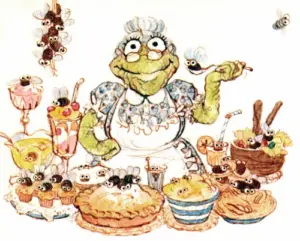 “The kingdom of heaven may be compared to a king . . . .”
“The kingdom of heaven may be compared to a king . . . .”
This is an ugly parable that Matthew reports in today’s gospel. It is similar to a parable that is related in Luke’s gospel, but Matthew adds details that challenge us deeply, even to the core of our faith, to the center of our being as Christians. When Luke tells the story, the host inviting his neighbors to dinner is not a king; he’s just “someone.”[1] When Luke’s host sends his servant to tell the intended guests that all is ready, they offer only excuses; no one “makes light” of the occasion and no one seizes, mistreats, or kills the slaves as happens in the Matthean version.[2] Luke’s host gets angry, but only Matthew’s king sends an army “destroy the murderers and burn their city.”[3] Both hosts send the slaves back out to invite others from the streets and highways; Luke’s dinner host adds an instruction specifically to invite “the poor, the crippled, the blind, and the lame.”[4] In both stories the banquet hall is filled, but only in Matthew’s story is there the judgment, not mentioned in Luke’s, that the substitute guests include “both good and bad.”[5] And, finally, Matthew’s Jesus adds the detail about the man present without the proper wedding garment who is thrown into the “outer darkness” and that final warning, “Many are called, but few are chosen.”[6]
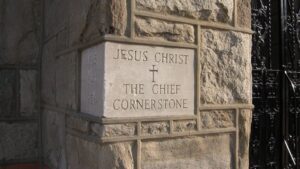 This is the second of three Sundays during which our lessons from the Gospel according to Matthew tell the story of an encounter between Jesus and the temple authorities. Jesus has come into Jerusalem, entered the Temple and had a somewhat violent confrontation with “the money changers and … those who sold doves,”
This is the second of three Sundays during which our lessons from the Gospel according to Matthew tell the story of an encounter between Jesus and the temple authorities. Jesus has come into Jerusalem, entered the Temple and had a somewhat violent confrontation with “the money changers and … those who sold doves,” Power and authority. These are the subjects of our lessons from Scripture this morning. Later this month they will figure as key concepts in a trial scheduled to begin in Fulton County, Georgia. That trial will focus on an alleged attempt to disrupt, even to stop, what we have come to call “the peaceful transfer of power.” Historian Maureen MacDonald wrote a few years ago:
Power and authority. These are the subjects of our lessons from Scripture this morning. Later this month they will figure as key concepts in a trial scheduled to begin in Fulton County, Georgia. That trial will focus on an alleged attempt to disrupt, even to stop, what we have come to call “the peaceful transfer of power.” Historian Maureen MacDonald wrote a few years ago: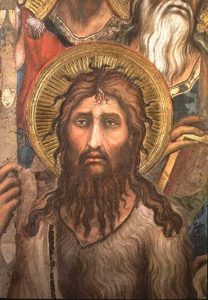 When I was a kid growing up first in southern Nevada and then in southern California, the weeks leading up to Christmas (we weren’t church members so we didn’t call them “Advent”) were always the same. They followed a pattern set by my mother. We bought a tree and decorated it; we set up a model electric train around it. We bought and wrapped packages and put them under the tree, making tunnels for that toy train. We went to the Christmas light shows in nearby parks and drove through the neighborhoods that went all out for cooperative, or sometimes competitive, outdoor displays. My mother would make several batches of bourbon balls (those confections made of crushed vanilla wafers and booze) and give them to friends and co-workers. Christmas Eve we would watch one or more Christmas movies on TV, and early Christmas morning we would open our packages . . . carefully so that my mother could save the wrapping paper. Then all day would be spent cooking and watching TV and playing bridge. After the big Christmas dinner, my step-father and I would do the clean up, my brother and my uncle would watch TV . . . and my mother would sneak off to her room and cry. You see . . . no matter how carefully we prepared, no matter how strictly we adhered to Mom’s pattern, something always went wrong. We never got it right; Christmas never turned out the way my mother wanted it to be.
When I was a kid growing up first in southern Nevada and then in southern California, the weeks leading up to Christmas (we weren’t church members so we didn’t call them “Advent”) were always the same. They followed a pattern set by my mother. We bought a tree and decorated it; we set up a model electric train around it. We bought and wrapped packages and put them under the tree, making tunnels for that toy train. We went to the Christmas light shows in nearby parks and drove through the neighborhoods that went all out for cooperative, or sometimes competitive, outdoor displays. My mother would make several batches of bourbon balls (those confections made of crushed vanilla wafers and booze) and give them to friends and co-workers. Christmas Eve we would watch one or more Christmas movies on TV, and early Christmas morning we would open our packages . . . carefully so that my mother could save the wrapping paper. Then all day would be spent cooking and watching TV and playing bridge. After the big Christmas dinner, my step-father and I would do the clean up, my brother and my uncle would watch TV . . . and my mother would sneak off to her room and cry. You see . . . no matter how carefully we prepared, no matter how strictly we adhered to Mom’s pattern, something always went wrong. We never got it right; Christmas never turned out the way my mother wanted it to be. Lenten Journal, Day 34
Lenten Journal, Day 34 “Take off the garment of your sorrow and affliction, O Jerusalem, and put on forever the beauty of the glory from God.”
“Take off the garment of your sorrow and affliction, O Jerusalem, and put on forever the beauty of the glory from God.”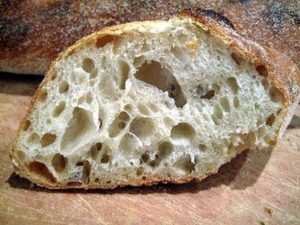 We have come to week four of our five week exploration of the metaphor of bread, the flesh of Jesus, the bread of life, the bread from heaven, the bread that gives life to the world. “I am the living bread that came down from heaven. Whoever eats of this bread will live forever; and the bread that I will give for the life of the world is my flesh,” says Jesus. “Just as the living Father sent me, and I live because of the Father, so whoever eats me will live because of me.”
We have come to week four of our five week exploration of the metaphor of bread, the flesh of Jesus, the bread of life, the bread from heaven, the bread that gives life to the world. “I am the living bread that came down from heaven. Whoever eats of this bread will live forever; and the bread that I will give for the life of the world is my flesh,” says Jesus. “Just as the living Father sent me, and I live because of the Father, so whoever eats me will live because of me.” Our Old Testament lesson this morning is a very small bit of the Book of Job, that really sort odd bit of Biblical literature that tells the story of a wager between God and Satan. Some scholars believe that it may find its origins in an earlier Babylonian work known as the Poem of the Righteous Sufferer, that the Jews in Exile became familiar with the older Babylonian story and adapted it to their own theology.
Our Old Testament lesson this morning is a very small bit of the Book of Job, that really sort odd bit of Biblical literature that tells the story of a wager between God and Satan. Some scholars believe that it may find its origins in an earlier Babylonian work known as the Poem of the Righteous Sufferer, that the Jews in Exile became familiar with the older Babylonian story and adapted it to their own theology.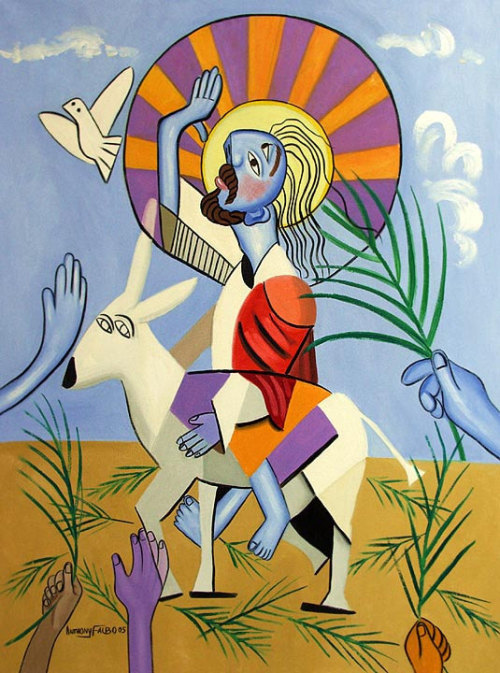 Today we are commemorating Jesus’ entry into Jerusalem at the beginning of the week that would culminate in his death on the cross of Calvary. Somewhat contrary to common sense, this has come to be called the “triumphal entry.” I don’t know who first applied this term to Jesus making his way from Bethany and Bethphage, through the Kidron Valley, also known as the valley of Jehosophat or the valley of decision, into the holy city. I’ve often thought that whoever it was must surely have been a master of irony, or perhaps of sarcasm, for the procession was anything but a triumph!
Today we are commemorating Jesus’ entry into Jerusalem at the beginning of the week that would culminate in his death on the cross of Calvary. Somewhat contrary to common sense, this has come to be called the “triumphal entry.” I don’t know who first applied this term to Jesus making his way from Bethany and Bethphage, through the Kidron Valley, also known as the valley of Jehosophat or the valley of decision, into the holy city. I’ve often thought that whoever it was must surely have been a master of irony, or perhaps of sarcasm, for the procession was anything but a triumph! “The kingdom of heaven may be compared to a king . . . .”
“The kingdom of heaven may be compared to a king . . . .” 

